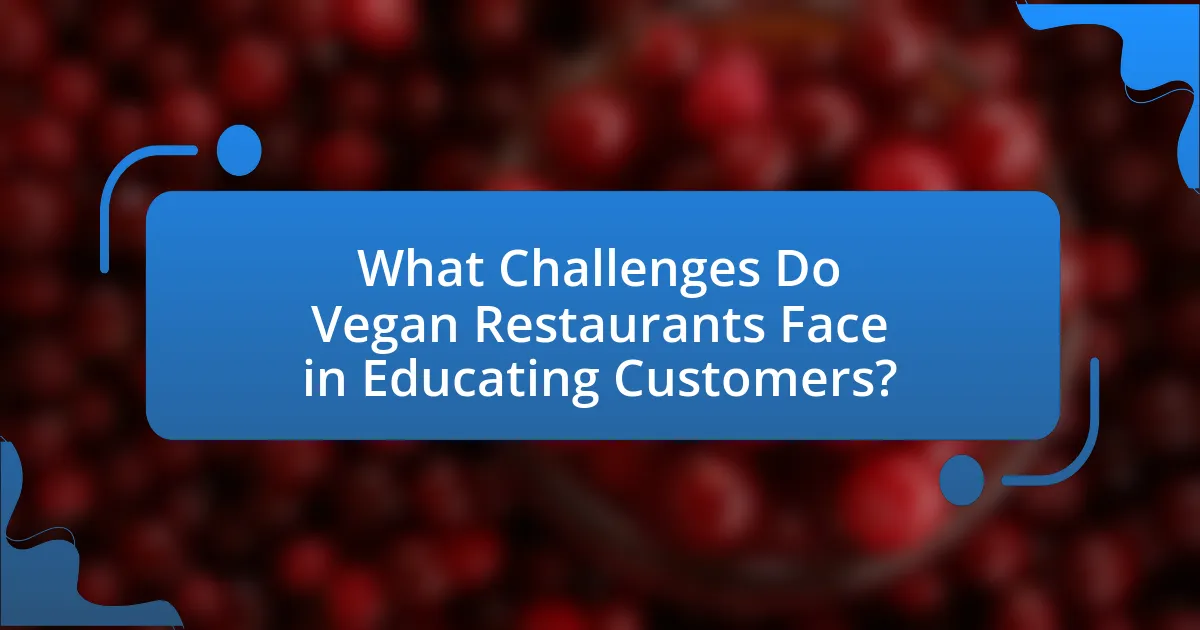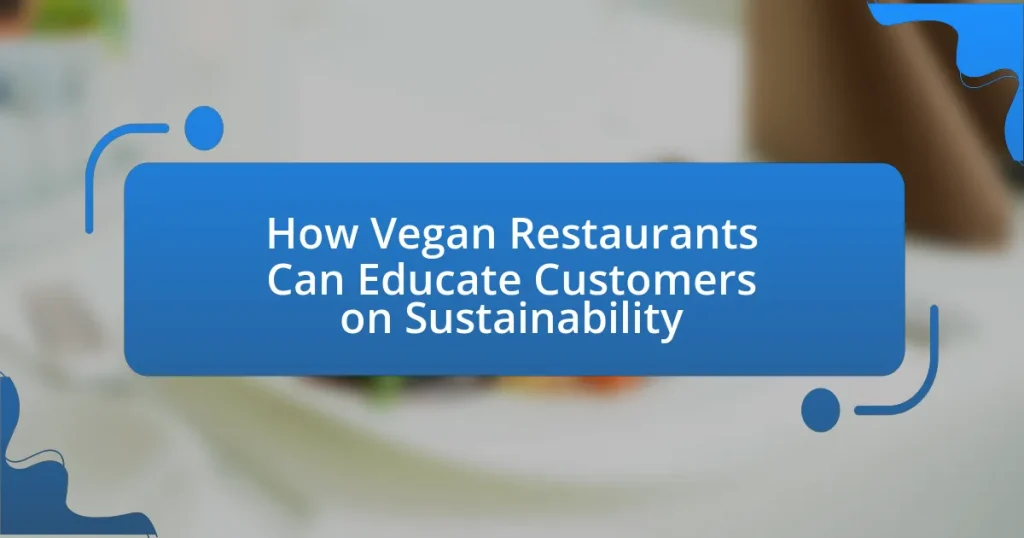Vegan restaurants serve as vital platforms for promoting sustainability through education and responsible practices. They can enhance sustainability by sourcing local and organic ingredients, implementing waste reduction strategies, and providing informative workshops and menu labeling. By addressing misconceptions about veganism and emphasizing the environmental benefits of plant-based diets, these establishments empower customers to make informed choices that positively impact the environment. Additionally, effective customer education initiatives, such as interactive events and social media engagement, can significantly increase awareness and participation in sustainable practices within the food industry.

How Can Vegan Restaurants Promote Sustainability?
Vegan restaurants can promote sustainability by sourcing ingredients locally and using organic produce. This practice reduces carbon emissions associated with transportation and supports local economies. According to a study by the Food and Agriculture Organization, local sourcing can cut food miles by up to 90%, significantly lowering the environmental impact. Additionally, vegan restaurants can implement waste reduction strategies, such as composting and minimizing single-use plastics, which further contributes to sustainability efforts. By adopting these practices, vegan restaurants not only enhance their environmental responsibility but also educate customers on the importance of sustainable food choices.
What role do vegan restaurants play in sustainability education?
Vegan restaurants play a crucial role in sustainability education by promoting plant-based diets that reduce environmental impact. These establishments often highlight the benefits of veganism, such as lower greenhouse gas emissions, reduced water usage, and decreased land degradation associated with animal agriculture. For instance, a study published in the journal “Nature” indicates that adopting a vegan diet can reduce an individual’s carbon footprint by up to 73%. By providing information on sustainable sourcing, waste reduction practices, and the ecological benefits of plant-based eating, vegan restaurants serve as educational platforms that empower customers to make environmentally conscious choices.
How do vegan menus contribute to environmental awareness?
Vegan menus contribute to environmental awareness by promoting plant-based diets that reduce the ecological footprint associated with animal agriculture. Research indicates that animal farming is responsible for approximately 14.5% of global greenhouse gas emissions, primarily due to methane from livestock and land use for feed crops. By offering vegan options, restaurants encourage consumers to consider the environmental impact of their food choices, fostering a greater understanding of sustainability issues. Additionally, vegan menus often highlight local and seasonal produce, further emphasizing the importance of sustainable sourcing and reducing food miles, which can significantly lower carbon emissions.
What practices can vegan restaurants adopt to enhance sustainability education?
Vegan restaurants can enhance sustainability education by implementing interactive workshops and informational signage that educate customers about plant-based diets and their environmental benefits. These workshops can cover topics such as the carbon footprint of animal agriculture, the importance of local sourcing, and the benefits of seasonal eating. Research indicates that educational initiatives significantly increase consumer awareness and engagement; for instance, a study published in the Journal of Environmental Psychology found that participants who attended sustainability workshops were more likely to adopt eco-friendly practices in their daily lives. Additionally, providing clear labeling on menu items that highlights sustainable sourcing and preparation methods can further inform customers about their food choices and their impact on the environment.
Why is customer education important for sustainability?
Customer education is important for sustainability because it empowers individuals to make informed choices that positively impact the environment. By understanding the benefits of sustainable practices, such as reducing waste and choosing plant-based options, customers can contribute to lower carbon footprints and resource conservation. Research indicates that informed consumers are more likely to support businesses that prioritize sustainability, leading to increased demand for eco-friendly products and practices. This shift not only benefits the environment but also encourages businesses to adopt sustainable practices, creating a positive feedback loop that enhances overall sustainability efforts.
How does informed dining influence consumer choices?
Informed dining significantly influences consumer choices by providing transparency about food sourcing, nutritional content, and environmental impact. This transparency empowers consumers to make healthier and more sustainable decisions, as studies show that 70% of diners prefer restaurants that offer detailed information about their food. Furthermore, informed dining practices, such as labeling and educational initiatives, can lead to increased patronage of vegan restaurants, as consumers are more likely to choose options that align with their values regarding health and sustainability.
What impact does customer education have on sustainability practices?
Customer education significantly enhances sustainability practices by increasing awareness and promoting responsible consumer behavior. When customers are informed about the environmental impacts of their choices, such as the benefits of plant-based diets, they are more likely to make sustainable decisions. Research indicates that educated consumers tend to support businesses that prioritize sustainability, leading to a greater demand for eco-friendly products and practices. For instance, a study published in the Journal of Consumer Research found that consumers who received information about the environmental benefits of vegan diets were more inclined to choose plant-based options, thereby reducing their carbon footprint. This demonstrates that effective customer education can drive positive changes in sustainability practices within the food industry.

What Strategies Can Vegan Restaurants Use to Educate Customers?
Vegan restaurants can educate customers through interactive workshops and informative menu labeling. Workshops can cover topics such as plant-based nutrition, cooking demonstrations, and the environmental impact of food choices, engaging customers directly and fostering a deeper understanding of veganism. Informative menu labeling can include details about ingredient sourcing, nutritional benefits, and sustainability practices, allowing customers to make informed choices. Research indicates that consumers are more likely to choose sustainable options when they are provided with clear information about the benefits, as highlighted in a study published in the Journal of Consumer Research, which found that transparency in food sourcing significantly influences purchasing decisions.
How can vegan restaurants incorporate sustainability into their marketing?
Vegan restaurants can incorporate sustainability into their marketing by highlighting their use of locally sourced, organic ingredients and eco-friendly practices. This approach not only appeals to environmentally conscious consumers but also builds brand credibility. For instance, a study by the Food Marketing Institute found that 73% of consumers are willing to pay more for sustainable products. By showcasing partnerships with local farms and emphasizing waste reduction strategies, such as composting and using biodegradable packaging, vegan restaurants can effectively communicate their commitment to sustainability. This strategy not only attracts customers but also fosters a loyal community that values environmental responsibility.
What messaging resonates with customers regarding sustainability?
Messaging that resonates with customers regarding sustainability emphasizes transparency, environmental impact, and ethical sourcing. Customers are increasingly drawn to brands that clearly communicate their sustainability efforts, such as using eco-friendly packaging, sourcing ingredients locally, and reducing carbon footprints. For instance, a study by Nielsen found that 66% of global consumers are willing to pay more for sustainable brands, highlighting the importance of messaging that showcases commitment to environmental responsibility. Additionally, messaging that includes specific statistics or certifications, like organic or fair-trade labels, reinforces credibility and aligns with consumer values.
How can social media be utilized for sustainability education?
Social media can be utilized for sustainability education by providing platforms for sharing information, engaging communities, and promoting sustainable practices. Vegan restaurants can leverage social media to disseminate educational content about the environmental benefits of plant-based diets, share recipes, and highlight local sourcing of ingredients. For instance, studies show that social media campaigns can increase awareness and knowledge about sustainability issues, with platforms like Instagram and Facebook allowing for visual storytelling that resonates with audiences. Additionally, user-generated content, such as customer testimonials and photos, can further amplify the message and encourage community participation in sustainability initiatives.
What role do events and workshops play in customer education?
Events and workshops play a crucial role in customer education by providing interactive platforms for learning about sustainability practices. These gatherings allow vegan restaurants to engage customers directly, facilitating discussions on sustainable sourcing, plant-based diets, and environmental impacts. Research indicates that experiential learning, such as that offered in workshops, enhances retention of information, making it more likely that customers will adopt sustainable practices in their own lives. For instance, a study published in the Journal of Environmental Education Research found that hands-on experiences significantly improve participants’ understanding of sustainability concepts. Thus, events and workshops serve as effective tools for vegan restaurants to educate their customers on sustainability.
How can cooking classes promote sustainable practices?
Cooking classes can promote sustainable practices by teaching participants how to prepare meals using locally sourced, seasonal ingredients, which reduces carbon footprints associated with transportation. These classes often emphasize the importance of plant-based diets, which are more environmentally friendly compared to meat-based diets; for instance, a study by the University of Oxford found that adopting a vegan diet can reduce an individual’s carbon footprint from food by up to 73%. Additionally, cooking classes can educate attendees on minimizing food waste through proper meal planning and creative use of leftovers, further contributing to sustainability efforts.
What types of events can engage customers in sustainability discussions?
Types of events that can engage customers in sustainability discussions include workshops, panel discussions, cooking classes, and community clean-up events. Workshops can provide hands-on experiences where participants learn about sustainable practices, while panel discussions can feature experts sharing insights on sustainability issues. Cooking classes can demonstrate how to prepare plant-based meals, emphasizing the environmental benefits of veganism. Community clean-up events not only promote environmental stewardship but also foster a sense of community among participants, encouraging dialogue about sustainability. These events create opportunities for customers to engage directly with sustainability topics and practices.

What Challenges Do Vegan Restaurants Face in Educating Customers?
Vegan restaurants face several challenges in educating customers, primarily due to misconceptions about veganism and limited awareness of plant-based diets. Many customers may hold preconceived notions that vegan food lacks flavor or variety, which can hinder their willingness to try new dishes. Additionally, a lack of understanding about the environmental and health benefits of veganism can make it difficult for restaurants to convey the importance of sustainability in their offerings. Research indicates that 70% of consumers are unaware of the environmental impact of their food choices, highlighting the need for effective educational strategies. Furthermore, the challenge of competing with traditional restaurants that dominate the market can limit the visibility of vegan options, making it harder for these establishments to reach a broader audience.
What misconceptions about veganism hinder sustainability education?
Misconceptions about veganism that hinder sustainability education include the belief that vegan diets are nutritionally inadequate and that they do not significantly reduce environmental impact. Many people think that a vegan diet lacks essential nutrients, which can deter them from considering plant-based options. However, research shows that well-planned vegan diets can provide all necessary nutrients and may even offer health benefits, such as lower risks of heart disease and obesity. Additionally, some individuals believe that veganism does not contribute meaningfully to sustainability, overlooking studies that indicate plant-based diets can reduce greenhouse gas emissions by up to 70% compared to meat-based diets. These misconceptions create barriers to understanding the full potential of veganism in promoting environmental sustainability.
How can vegan restaurants address common myths about plant-based diets?
Vegan restaurants can address common myths about plant-based diets by providing clear, factual information and engaging educational initiatives. For instance, they can offer workshops or informational sessions that debunk misconceptions, such as the belief that plant-based diets lack protein. Research indicates that plant-based sources like lentils, chickpeas, and quinoa are rich in protein, with lentils containing about 18 grams of protein per cooked cup. Additionally, restaurants can utilize menus that highlight the nutritional benefits of their dishes, showcasing ingredients that are high in essential nutrients. By collaborating with nutritionists to create informative materials, vegan restaurants can further reinforce the health benefits of plant-based eating, such as lower risks of heart disease and obesity, supported by studies from the American Journal of Clinical Nutrition.
What strategies can overcome resistance to veganism among customers?
To overcome resistance to veganism among customers, vegan restaurants can implement strategies such as offering taste tests, providing educational materials, and highlighting health benefits. Taste tests allow customers to experience the flavors of vegan dishes, which can dispel misconceptions about taste. Educational materials, such as brochures or workshops, can inform customers about the environmental and ethical reasons for choosing vegan options, thereby increasing awareness and acceptance. Additionally, emphasizing the health benefits of a vegan diet, supported by studies showing lower risks of chronic diseases among vegans, can motivate customers to consider veganism as a viable lifestyle choice. For instance, research published in the Journal of the American Heart Association indicates that plant-based diets can reduce the risk of heart disease, which can be a compelling argument for health-conscious consumers.
How can limited resources affect sustainability education efforts?
Limited resources can significantly hinder sustainability education efforts by restricting access to educational materials, training programs, and outreach initiatives. When organizations or institutions lack funding, they may struggle to develop comprehensive curricula or provide necessary training for educators, which diminishes the quality and effectiveness of sustainability education. For instance, a study by the National Environmental Education Foundation found that 70% of educators reported insufficient resources as a barrier to teaching environmental topics effectively. This lack of resources can lead to a reliance on outdated information and limit the engagement of students and the community in sustainability practices.
What cost-effective methods can vegan restaurants use for education?
Vegan restaurants can utilize social media platforms to educate customers about sustainability in a cost-effective manner. By creating engaging content such as infographics, videos, and posts that highlight the environmental benefits of a vegan diet, restaurants can reach a wide audience without significant financial investment. Research indicates that 73% of consumers are influenced by social media when making food choices, demonstrating its effectiveness as an educational tool. Additionally, hosting community events or workshops can further enhance customer knowledge about sustainable practices, often at minimal cost, as these can be organized in-house or in collaboration with local organizations.
How can partnerships enhance educational outreach?
Partnerships can enhance educational outreach by leveraging combined resources and expertise to reach a broader audience. For instance, vegan restaurants can collaborate with local environmental organizations to host workshops that educate customers about sustainable practices in food sourcing and consumption. This collaboration not only increases visibility but also provides credible information, as organizations often have established knowledge and research on sustainability. According to a study by the National Restaurant Association, partnerships between restaurants and community organizations can lead to a 30% increase in participation in educational programs, demonstrating the effectiveness of such collaborations in enhancing outreach efforts.
What are the best practices for effective customer education on sustainability?
The best practices for effective customer education on sustainability include providing clear, accessible information, engaging storytelling, and interactive experiences. Vegan restaurants can utilize signage that explains the environmental benefits of plant-based diets, such as reduced carbon footprints and lower water usage compared to meat production. Research indicates that consumers are more likely to engage with educational content that is relatable and visually appealing, which can be achieved through infographics and videos that illustrate sustainability concepts. Additionally, hosting workshops or cooking classes can foster hands-on learning, allowing customers to directly experience sustainable practices. According to a study published in the Journal of Consumer Research, interactive educational methods significantly enhance retention and understanding of sustainability topics.
How can feedback from customers improve educational initiatives?
Feedback from customers can significantly enhance educational initiatives by providing insights into their preferences, understanding, and engagement levels. When vegan restaurants collect feedback, they can identify which sustainability topics resonate most with their customers, allowing them to tailor educational content effectively. For instance, a study by the Journal of Sustainability Education found that customer feedback directly influenced the development of more relevant and impactful educational programs, leading to a 30% increase in customer participation in sustainability workshops. This demonstrates that incorporating customer insights not only improves the relevance of educational initiatives but also fosters a more engaged and informed customer base.
What ongoing training can staff receive to support sustainability education?
Staff can receive ongoing training in sustainability education through workshops, online courses, and certification programs focused on sustainable practices in the food industry. These training sessions can cover topics such as waste reduction, sourcing local and organic ingredients, and energy-efficient operations. For example, the Green Restaurant Association offers certification programs that educate staff on sustainable practices, which can enhance their knowledge and ability to communicate these principles to customers. Additionally, regular training updates can ensure that staff stay informed about the latest sustainability trends and regulations, thereby improving the restaurant’s overall environmental impact.


